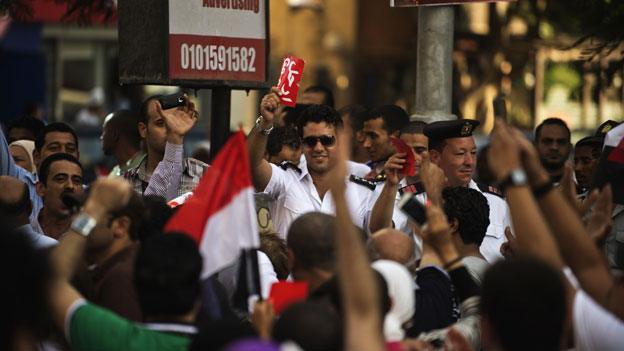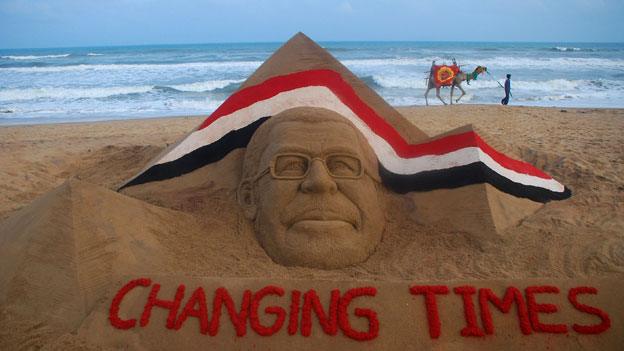Egypt: A presidential democracy without a president
- Published

Some Cairo police joined in the protests
A little over two years ago the long reign of the brilliantined autocrat Hosni Mubarak ended when tidal waves of protests in Cairo swept him from power. Tahrir Square was suddenly as famous as Times Square or Trafalgar or Tiananmen.
You knew the game was up for Mr Mubarak when the uniformed security forces of the state melted away leaving the city streets to vigilantes armed with everything from hockey sticks to handguns.
A police state without any policemen clearly wasn't going to last for long.
A few hours after Mr Mubarak's democratically elected successor Mohammed Morsi was dumped from office and arrested by Egypt's generals this week I couldn't help noticing that this time there were plenty of men in uniform out and about.
As we drove past a foreign embassy in one leafy suburb a couple of the policemen outside it were dancing in the streets - not something you want to see in men carrying Kalashnikovs.
Egypt once again found itself in a rather paradoxical state. This time it was a presidential democracy without a president.
The policemen were delighted. Mohammed Morsi came from the ranks of the Muslim Brotherhood an Islamist movement that was born in Egypt 85 years ago and which members of the security forces were trained to view as a subversive organisation.
Those dancing policemen were celebrating what they presumably regarded as a kind of restoration of normal service. Instead of taking orders from members of the Brotherhood they were taking them into custody.
There were rumours - eventually confirmed - that Morsi and some of his top advisers had been arrested. It was said his mobile phone was confiscated and his wife was unable to get in touch with him, a sudden and startling humiliation for Egypt's first couple.
Mr Morsi was unpopular. He has whatever the opposite of charisma is, for a start, and he never got to grips with the grinding problems of poverty and unemployment which Egypt faces.
The coming of democracy raised expectations that no president could have satisfied - and nothing in Morsi's life as a backroom Brotherhood activist equipped him for the task.
And yet there are plenty of Egyptians who won't mourn Morsi's passing but who are nonetheless uncomfortable with the manner of it.
Supporters of the generals see them as custodians of the national spirit - with a kind of over-arching, extra-constitutional right to intervene at moments of national crisis.
They would say they're executing the will of the people, as expressed by the vast public rallies against Mr Morsi in recent days.
They alone took the decision that those protests somehow trump the will of the people as expressed through the ballot box last year.

A sand sculpture of ousted Egyptian president Mohammed Morsi
The most interesting and the most dangerous question in Egyptian politics is this. What if fresh elections are held and a candidate from the Muslim Brotherhood wins again?
It is a far from impossible outcome. The Brotherhood has been damaged by Morsi's lacklustre period in office but they remain the best-organised force in the country. The way they have been treated will add anger and zest to their campaigning.
Would a second Islamist president go the way of the first, with the generals insisting he too was unfit to govern?
Supporters of Morsi are furious at the way he's been treated.
They see this as a straightforward military coup, albeit a relatively softly-spoken one.
And they believe the West, even if it's a little squeamish about the means, is happy enough to see the removal from office of a man with whom they never felt instinctively uncomfortable.
In Washington, London and Paris they might be hoping for a future leader who's easier to deal with on pressing issues like Syria.
The message of Morsi's supporters is simple. A military coup is a bad thing even if its directed against someone you don't particularly like.
Much will depend now on how quickly Egypt moves towards new elections and how free and fair they will be. And on whether the army respects the results.
Egypt's military has huge economic interests of its own to protect and exercising power is proving to be a hard habit to break.
And the mood on the streets here can be volatile.
It is true that huge crowds here celebrated the army's decision to remove Morsi from office. But then the last time the generals were in control Cairo was filled with protesters demanding they hand power to a civilian administration.
No-one ever thought that this vast country could move from authoritarianism to democracy without a hitch but this lurching push-me-pull-you transition is worse than it needed to be. And all the time the desperate problems of poverty are getting worse.
These are turbulent times here, when politics is transacted partly in private meetings between generals and partly in public gatherings.
You can be pretty sure that one side or the other will be dancing in the streets again before too long. I wonder if it will be still be those young policemen this time next year.
How to listen to From Our Own Correspondent, external:
BBC Radio 4: Saturdays at 11:30 and some Thursdays at 11:00
Listen online or download the podcast.
BBC World Service: Short editions Monday-Friday - see World Service programme schedule.
You can follow the Magazine on Twitter, external and on Facebook, external